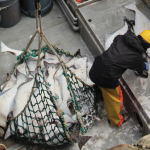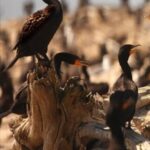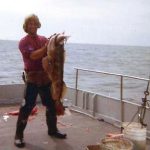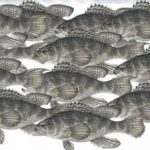Daily Archives: September 8, 2015
Deadliest year for B.C. fishermen in a decade
 This has become the deadliest year for B.C. fishermen in a decade, following the capsizing of a commercial fishing boat north of Tofino on the weekend, says the Transportation Safety Board. Three crew members died when the Caledonian, owned by Pacific Seafood, capsized Saturday night, at about 8 pm. PT, off Estevan Point on the west coast of Vancouver Island. That brings the number of deaths in B.C. fishing to six for 2015, said Glenn Budden, a senior marine investigator with the Transportation Safety Board. “It’s not been a good year for B.C. fishermen,” Read the rest here 21:45
This has become the deadliest year for B.C. fishermen in a decade, following the capsizing of a commercial fishing boat north of Tofino on the weekend, says the Transportation Safety Board. Three crew members died when the Caledonian, owned by Pacific Seafood, capsized Saturday night, at about 8 pm. PT, off Estevan Point on the west coast of Vancouver Island. That brings the number of deaths in B.C. fishing to six for 2015, said Glenn Budden, a senior marine investigator with the Transportation Safety Board. “It’s not been a good year for B.C. fishermen,” Read the rest here 21:45
Salmon ‘nightmare’ ahead?
 Oregon and Washington will experience two big El Nino-like events in combination this year, scientists and fishery managers say. This has never happened before and the events could have major impacts on commercial and recreational fisheries — and ocean species from salmon to orcas — for years to come. One of these events is a true El Nino — a big one — and brings with it the likelihood of less precipitation and warmer temperatures in the Pacific Northwest. The other event, the “Blob,” is a warm expanse of water that has persisted off the West Coast for over a year and only resembles El Nino. It is an anomaly, a mystery. Read the rest here 19:59
Oregon and Washington will experience two big El Nino-like events in combination this year, scientists and fishery managers say. This has never happened before and the events could have major impacts on commercial and recreational fisheries — and ocean species from salmon to orcas — for years to come. One of these events is a true El Nino — a big one — and brings with it the likelihood of less precipitation and warmer temperatures in the Pacific Northwest. The other event, the “Blob,” is a warm expanse of water that has persisted off the West Coast for over a year and only resembles El Nino. It is an anomaly, a mystery. Read the rest here 19:59
Divide between Newfoundland’s crab fishers, diners is hard to swallow
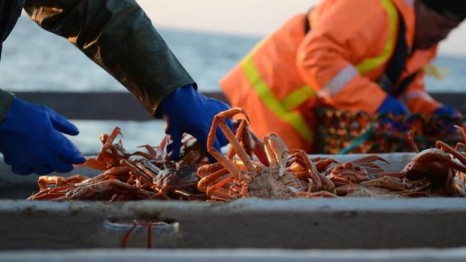 Fishermen have been valued members of society since at least the time of the apostle Peter, a fisherman (and fisher of men) who is still the rock of the Catholic Church. Take Newfoundlander Tony Doyle, the vice-president of the , as well as a grandfather of three and survivor of the infamous 1992 cod moratorium. He’s a really great guy – and he’s getting ripped off by the Canadian government. Read the rest here The writer was doing pretty good ’till he used the chefs such as Hugh Fearnley-Whittingstall thing! 18:49
Fishermen have been valued members of society since at least the time of the apostle Peter, a fisherman (and fisher of men) who is still the rock of the Catholic Church. Take Newfoundlander Tony Doyle, the vice-president of the , as well as a grandfather of three and survivor of the infamous 1992 cod moratorium. He’s a really great guy – and he’s getting ripped off by the Canadian government. Read the rest here The writer was doing pretty good ’till he used the chefs such as Hugh Fearnley-Whittingstall thing! 18:49
Seafood shops take local fish off menu in protest of proposed net-free fishing zones
 Several specialist seafood shops in central Queensland will voluntarily take some items off the menu this week to protest the . “The varieties that people won’t find in the windows this week are the region’s popular estuary fish, including barramundi, king threadfin, blue salmon, diamond-scale mullet and flake,” Mr Swindells said. “These are the fish that local commercial fishermen will no longer be able to catch in a 1500 sq km area taking in the entire Fitzroy River and delta, Port Alma and Corio Bay and out to sea past the Keppel Islands. Read the rest here 18:17
Several specialist seafood shops in central Queensland will voluntarily take some items off the menu this week to protest the . “The varieties that people won’t find in the windows this week are the region’s popular estuary fish, including barramundi, king threadfin, blue salmon, diamond-scale mullet and flake,” Mr Swindells said. “These are the fish that local commercial fishermen will no longer be able to catch in a 1500 sq km area taking in the entire Fitzroy River and delta, Port Alma and Corio Bay and out to sea past the Keppel Islands. Read the rest here 18:17
UK FISHERIES survey logbooks from the 1930s to 1950s have been digitised for the first time – What took them so long?
 Scientists at the Centre for Environment, Fisheries and Aquaculture Science (Cefas) and the University of Exeter found that at the time, the warm seas experienced around Norway benefitted the cod, similar to the conditions there today. The Barents Sea surveys were mainly carried out by the steam vessel RV Ernest Holt, which was commissioned especially to withstand Arctic conditions. Scientists at the time knew that the cod were being affected by their environmental conditions, but digitising this data has meant that much more modern techniques can be used to delve into the responses of cod to changes in their environment and diet. Read the rest here 15:45
Scientists at the Centre for Environment, Fisheries and Aquaculture Science (Cefas) and the University of Exeter found that at the time, the warm seas experienced around Norway benefitted the cod, similar to the conditions there today. The Barents Sea surveys were mainly carried out by the steam vessel RV Ernest Holt, which was commissioned especially to withstand Arctic conditions. Scientists at the time knew that the cod were being affected by their environmental conditions, but digitising this data has meant that much more modern techniques can be used to delve into the responses of cod to changes in their environment and diet. Read the rest here 15:45
NOAA Northwest Fisheries Science Center Scientists link oil exposure to reduced survival of fish
 Federal scientists may have found a link between the 1989 Exxon Valdez oil spill and a decline of herring and pink salmon populations in Prince William Sound.In a study published Tuesday in the online journal Scientific Reports, researchers from the National Oceanic and Atmospheric Administration found that embryonic salmon and herring exposed to even very low levels of crude oil can develop heart defects. Herring and pink salmon juveniles that were exposed to crude oil as embryos grew slower and swam slower, making them vulnerable to predators, said John Incardona, a research toxicologist at NOAA Fisheries’ Northwest Fisheries Science Center in Seattle, in a prepared statement “In terms of impacts to shore-spawning fish, the oil spill likely had a much bigger footprint than anyone realized.” Read the rest here 15:10
Federal scientists may have found a link between the 1989 Exxon Valdez oil spill and a decline of herring and pink salmon populations in Prince William Sound.In a study published Tuesday in the online journal Scientific Reports, researchers from the National Oceanic and Atmospheric Administration found that embryonic salmon and herring exposed to even very low levels of crude oil can develop heart defects. Herring and pink salmon juveniles that were exposed to crude oil as embryos grew slower and swam slower, making them vulnerable to predators, said John Incardona, a research toxicologist at NOAA Fisheries’ Northwest Fisheries Science Center in Seattle, in a prepared statement “In terms of impacts to shore-spawning fish, the oil spill likely had a much bigger footprint than anyone realized.” Read the rest here 15:10
Asian Shrimp Imports Are Chewing Up U.S. Suppliers
 The most-popular seafood in the U.S. isn’t very American anymore, but it sure is getting cheaper. A surge of importedshrimp from Indonesia, Ecuador andIndia has sent prices plunging by more than a third in the past year. While that’s good news for consumers, who eat more of the crustaceans than any aquatic creature, including salmon and tuna, record supplies from foreign shrimp farms is compounding the strain on U.S. fishermen, who have seen their share of the domestic market shrink to about 10 percent. Read the rest here 12:08
The most-popular seafood in the U.S. isn’t very American anymore, but it sure is getting cheaper. A surge of importedshrimp from Indonesia, Ecuador andIndia has sent prices plunging by more than a third in the past year. While that’s good news for consumers, who eat more of the crustaceans than any aquatic creature, including salmon and tuna, record supplies from foreign shrimp farms is compounding the strain on U.S. fishermen, who have seen their share of the domestic market shrink to about 10 percent. Read the rest here 12:08
The Pacific Fishery Management Council will meet September 9‐16, 2015 in Sacramento, California,
 The Pacific Fishery Management Council and its advisory bodies will meet September 9‐16, 2015 in Sacramento, California, to address issues related to management of groundfish, highly migratory species, ecosystem management, salmon, Pacific halibut, and habitat matters. Download the September 9-16, 2015 Meeting Notice WITH Detailed Agenda (includes public comment deadlines and other logistic information) Download the September 9-16, 2015 Detailed Agenda (agenda only) Join the meeting by visiting this link: Click here Webinar ID is: 141-257-515 10:26
The Pacific Fishery Management Council and its advisory bodies will meet September 9‐16, 2015 in Sacramento, California, to address issues related to management of groundfish, highly migratory species, ecosystem management, salmon, Pacific halibut, and habitat matters. Download the September 9-16, 2015 Meeting Notice WITH Detailed Agenda (includes public comment deadlines and other logistic information) Download the September 9-16, 2015 Detailed Agenda (agenda only) Join the meeting by visiting this link: Click here Webinar ID is: 141-257-515 10:26
Commercial fisherman remembers 3 colleagues who died when their boat, the Caledonian, capsized
 A crew member from the sister ship of the one that capsized off Vancouver Island over the weekend, is speaking out about the loss of three men and the decision that saved a fourth man’s life. “They were good, hardworking family-loving men who unfortunately aren’t going to make it home tonight,” said one fisherman who did not want to be identified. He has worked on both and its sister ship, the Viking Storm. The Caledonian is the boat that capsized. Captain Wes Hegglend and two other crew members died when the Caledonian experienced what is believed to be some kind of stabilization issue and capsized. Video interview Read the rest here 07:21
A crew member from the sister ship of the one that capsized off Vancouver Island over the weekend, is speaking out about the loss of three men and the decision that saved a fourth man’s life. “They were good, hardworking family-loving men who unfortunately aren’t going to make it home tonight,” said one fisherman who did not want to be identified. He has worked on both and its sister ship, the Viking Storm. The Caledonian is the boat that capsized. Captain Wes Hegglend and two other crew members died when the Caledonian experienced what is believed to be some kind of stabilization issue and capsized. Video interview Read the rest here 07:21
































